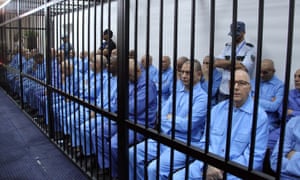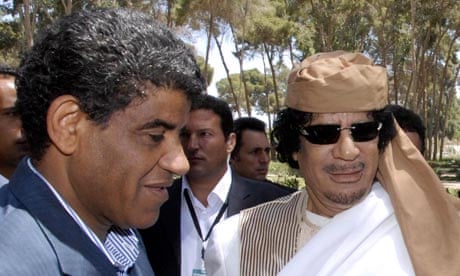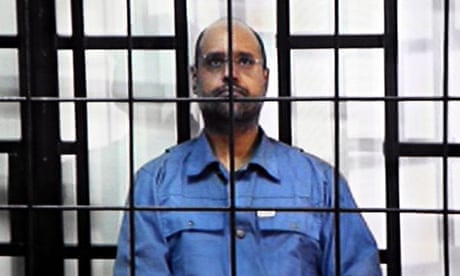Saif al-Islam Gaddafi, the son of Libya’s former dictator, Muammar Gaddafi, has been sentenced to death by a court in Tripoli in a mass trial of former regime figures widely criticised by human rights groups and observers.
Saif Gaddafi, once seen as his father’s heir apparent, was condemned to death along with eight other figures from the former dictatorship, including the former intelligence chief Abdullah al-Senussi and Gaddafi’s last prime minister, Al-Baghdadi Ali al-Mahmoudi.
The trial, which opened in Tripoli in April last year, has been mired in controversy after human rights groups and the international criminal court questioned its standards.
There is uncertainty about whether the sentence will be carried out, as Gaddafi is being held by a militia in the mountain town of Zintan that is opposed to LibyaDawn, the militia coalition in control of Tripoli.
Gaddafi has been held in Zintan since he was caught trying to flee Libya in the aftermath of the 2011 revolution. The militia has refused to hand him over to Tripoli.
He was accused in the trial of recruiting mercenaries, attacking civilian targets from the air, forming armed groups and shooting into crowds of demonstrators. Among the charges he was convicted of were incitement to murder and rape.

The ICC indicted Gaddafi, along with Senussi, for war crimes and crimes against humanity but judges in The Hague refused Libya permission to try him. However, the ICC gave permission for Senussi to be tried in Libya, and the former intelligence chief – held in custody in Tripoli – was one of 28 defendants in court. Four of the Muammar Gaddafi-era figures were cleared of charges.
Amnesty International, Human Rights Watch and the International Bar Association issued statements criticising the proceedings, with IBA director Dr Mark Ellis saying several trial monitors were arrested and questioned by security forces.
Gaddafi’s ICC-appointed lawyer, John Jones, condemned the trial process. “It’s a complete show trial, a farce,” he said. “This trial is effectively being run by Libya Dawn militias.”
Jones said the videolink set up in Tripoli to allow Gaddafi to be tried had worked on only three occasions, leaving him in the dark about the proceedings. “They [Tripoli prosecutors] are relying on confessions from defendants extracted by torture. It was condemned by Libya’s own ministry of justice as illegal.”
In London, Senussi’s 17-year-old daughter, Salma, said her father had been denied a proper trial. “It’s like a nightmare every day waking up fearing to hear this. I ask the world for only one thing: for my father to have the law. We just want proper justice.”
Salma – in London with Senussi’s wife, Fatma, and his nine-year-old son after fleeing Libya – said her mother was too distressed to talk but was upset with the ICC judges for ruling that Senussi was getting a fair trial. She said: “I am angry with the international criminal court; it did not give my father a chance.”
Senussi was convicted in absentia in France in 1999 concerning the bombing of a French airliner over Niger in 1989 in which 170 people were killed. However, for ordinary Libyans, his name will always be associated with the 1996 massacre of 1,200 inmates at Tripoli’s Abu Salim prison.
Senussi’s London-based lawyer, Ben Emmerson QC, said “extreme fear, insecurity and intimidation” had dominated the trial. “The death sentence just handed down against Abdullah al-Senussi is the most deplorable decision in a case in which every one of his basic rights to a fair trial and due process have been completely ignored,” he said.
There are unlikely to be immediate executions after Sadiq al-Sur, head of the attorney general’s investigation department, said lawyers could appeal against the sentences. The nine death sentences are in two parts, with each defendant sentenced to die by firing squad and also fined 50,000 dinars (£23,481).
Civil war engulfed Libya last July, with Libya Dawn militias seizing the capital and the internationally recognised government fleeing to eastern Libya and losing control of the trial process.
The ICC chief prosecutor, Fatou Bensouda, said in February that although Libya Dawn militias now controlled Tripoli, she had no evidence the case against Senussi – which Libya was given permission to hold in 2013 – had been affected.
Her office said in a letter to Senussi’s lawyers: “Despite the fact that the groups allegedly associated with Libya Dawn are in physical control of Tripoli and therefore the judicial and correctional facility system, there does not appear to have been any significant disruption to the trial proceedings.”
The verdicts, after a chaotic and secretive trial process, underline the failure of Libya to implement the democracy promised in 2011 when, with assistance from Nato air strikes, it overthrew the Gaddafi dictatorship. The proceedings are also a blow to the prestige of the ICC and its decision that Libya was fit to hold the trial.
Divisions have emerged over the conduct of the trial between the ICC and the United Nations, which ordered the court to investigate Libya war crimes in 2011.
The UN support mission for Libya, which monitored the trial until it left the country with the onset of civil war last summer, reiterated its belief on Tuesday that the case had failed to meet international standards.
The UN catalogued a list of failings, including reported intimidation of witnesses, a lack of access to lawyers and no presentation of witnesses or documents in open court.
UN officials said the authorities in Tripoli had failed to ensure that trial sessions were broadcast in their entirety, despite Libyan law being amended to allow it.
Claudio Cordone, from the UN mission, said: “Given these shortcomings, it is particularly worrisome that the court has handed down nine death sentences.”
Controversy at the trial reached a new level in June 2014 when a UN trial monitor was taken prisoner by the militia guarding the courtroom and accused of black magic. Although the monitor was later released without charge, it set the tone for the trial.
The ICC, meanwhile, has already faced criticism for achieving only two war crimes convictions in its 13-year-history, while South Africa last month defied its orders and refused to arrest Sudanese president Omar al-Bashir, indicted for genocide, during his visit to Pretoria.
Its most high-profile case, against Kenyan president Uhuru Kenyatta, who was accused in connection with post-election violence that killed 1,200 people in 2007 and 2008, collapsed last year due to lack of evidence.
By Chris Stephen
http://www.theguardian.com/world/2015/jul/28/saif-al-islam-sentenced-dea...



